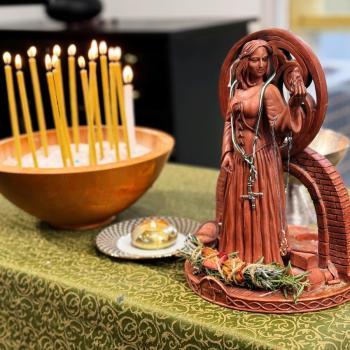The "Ask Mormon Girl" column offers unorthodox and imperfect answers to real-life questions from Mormon and non-Mormon readers around the world. Are you a Mormon with a real-life question burning in your bosom? Are you a non-Mormon with a question about Mormonism? Email [email protected]. Follow askmormongirl on Twitter, or visit the Ask Mormon Girl Facebook fanpage.
Dear AMG:
My husband and I have been married for two years. He's Jewish; I'm Mormon. Kids aren't in the picture . . . yet. But we plan on starting to try soon. All of which has me wondering how exactly we'll deal with the holidays, especially the Santa Claus issue. How do you handle Santa with your kids? Does Santa visit your house?
Signed,
AK
Dear AK:
When I received your letter, I thought I understood perfectly what my kids' relationship to Santa was.
After all, my husband and I set the holiday ground rules early in our Jewish-Mormon household. There would be no tree in the house, since my husband has a metaphysical allergy to the most goyische cultural trappings of Christmas. Husband set up his menorah, and I set up my humble manger scene, which was, after all, about the religious-Jesus-angels-Christmas, not the consumption Anchluss of the cultural-secular holiday season. But no tree. No trimmings. No stockings. And no Santa. All of that would stay at the in-laws.
"Growing up, what did you think of the kids who did believe in Santa Claus?" I asked husband one December.
"I thought they were stupid for not figuring out that their parents were lying to them."
What do Jewish kids get on Christmas morning? Cold hard reality and a small superiority complex. That's what.
A few years into our marriage, when daughter the elder arrived, I found myself tempted for the first time to stray from the restraint and deference of our jointly negotiated interfaith holiday non-aggression pact.
"Go on," I nudged daughter the elder at 14 months old, as she toddled up in her little pink Robeez toward the red-suited Santa stand-in at the department store, before she turned back to find us, her face seized in a spasm of terror.
"Yes!" husband pumped his fists, finding reason for hope that he might not be the only Jew in the family.
I don't remember exactly how or when daughter the eldest learned that Santa Claus was a powerful story and not a being of flesh and blood. He just simply never arrived at our house—a fact she certainly knew by the time had had obtained powers of speech in her third year. That's when my Mormon relatives sat me down and beseeched me to beseech daughter the eldest not to spoil the fun for her Santa-believing cousins.
And she never has. Nor has daughter the youngest. What a beautiful job they've done, these gracious, savvy, bicultural kids, keeping secrets for their aunts and uncles, while gradually by their example luring their father into some of the comforts of the season. Like cuddling with a sleeping curly-headed toddler in a packed cathedral pew on Christmas Eve, the warmest of places on the darkest of winter nights. Or seeing your 7-year-old play the cow in the church nativity.
And as for Santa, just last night, driving home, I asked daughter the eldest, "Do you feel like you've missed out, growing up without Santa Claus?"
She paused, and then, from the dark of the backseat, began to relate the following story: "Well, there was this one Christmas Eve, at Grandma and Grandpa's house. I must have been three or four. And I heard footsteps in the hallway, and I got out of my bed and saw Grandpa putting out gifts . . ."
My mouth fell open. Fiction. Total fiction.
"And that's how I knew," daughter the eldest concluded, "that Santa was not real."
And thus despite the holiday non-aggression pact carefully negotiated by the Mormon and Jewish adults in my family, my interfaith children absolutely have had a relationship with Santa Claus all on their own.
In fact, without ever really believing in Santa, my daughter found her own way to that incomparable feeling of looking back and remembering when she did believe in Santa. It's a powerfully spiritual feeling the Japanese call mono no aware—a sweet wistfulness, the poignancy of life in its gorgeous ephemerality.
Which leaves me on this dark winter night with the sweetly wistful feeling that daughter the elder and daughter the younger are figuring it all out for themselves and taking comfort in what they discover.
And that's the best any parents—of one faith, or two—can wish for their kids, with Santa or without.
Send your query to [email protected], follow askmormongirl on Twitter, or visit the Ask Mormon Girl Facebook page.
12/23/2010 5:00:00 AM





